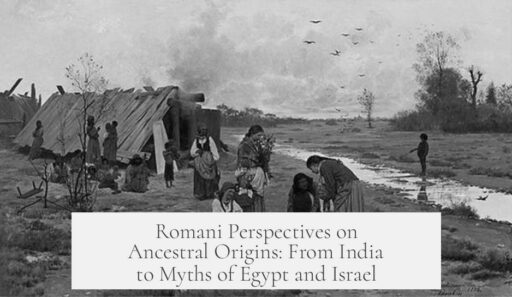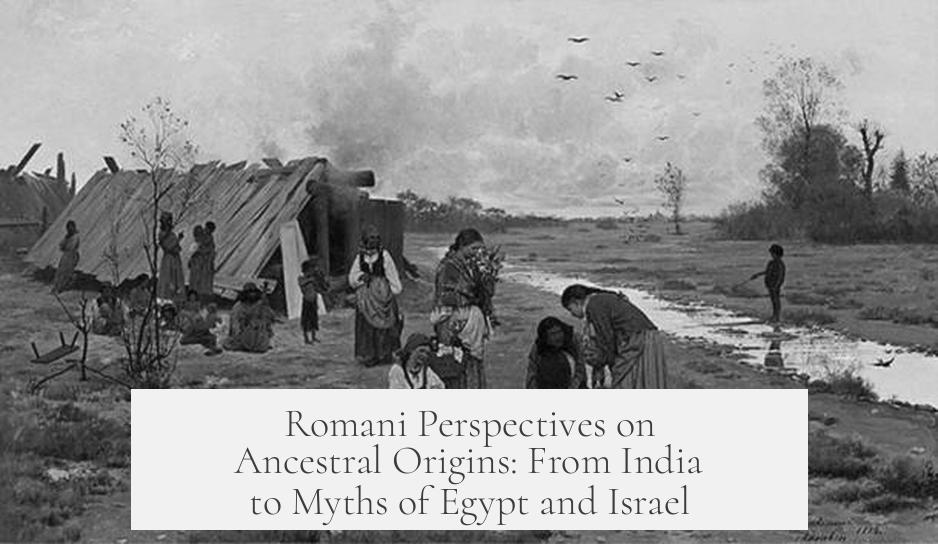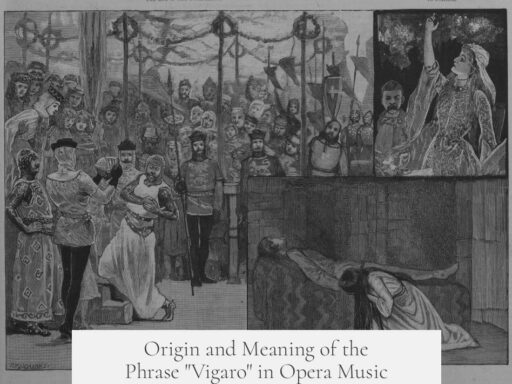The Romani traditionally think of their origins as being rooted in India, though their beliefs about this vary widely, reflecting centuries of migration and cultural change.
Early European encounters with Romani people recorded their claim of an Indian origin. For instance, in 1422, Foroliviensis noted Roma in Italy stating they were from India. Later, in 1544, Sebastian Munster reported that Roma in Germany said their homeland lay along the Ganges or Indus rivers. These accounts align with modern linguistic and genetic research pointing to the Indian subcontinent as the source of Romani ancestry.
Despite this, the Romani have developed several other origin myths over time. A persistent story is that they come from Egypt, a myth that may have arisen because Europeans confused Roma with Egyptians or early Roma themselves claimed Egyptian origins to outsiders. Another widespread belief, still held in communities such as those in Hungary and the United States, posits Romani descent from a lost tribe of Israel.
In Romania, many Romani share folk tales describing a vanished homeland. One story, “O Romano Them” (“The Romani Country”), recounts that their ancestors once had a country but left due to drought and have since forgotten their roots. Another tale, “O Kamipen” (“The Love”), explains the Romani’s lack of a homeland by stating they arrived late when God was dividing lands and instead received his love as a gift.
The loss of collective historical knowledge explains why many Roma were unaware of their Indian roots until scholarly research emerged. Dr. Ian Hancock highlights that some Romani communities regard the Indian origin narrative as a European concept, introduced by outsiders rather than preserved internally.
Unlike peoples with strong attachment to a land, Roma typically do not emphasize a connection to any particular homeland. This outlook possibly eased their extensive migrations and helped them endure widespread persecution in diverse countries. Most contemporary Roma take pride in their Indian origin but do not view India as a place to return to or claim as home.
| Aspect | Detail |
|---|---|
| Traditional Claim | Origin in India, supported by early European reports |
| Other Myths | Egyptian origin; lost tribe of Israel |
| Folk Stories (Romania) | “O Romano Them” and “O Kamipen” explain lost homeland and gift of divine love |
| Attachment to Homeland | Generally low; emphasizes nomadism and resilience |
| Modern Views | Pride in Indian origins but no interest in repatriation |
- Romani traditionally state their origin in India, a view supported by early European reports and language studies.
- Myths about Egyptian or Israelite ancestry also exist and persist in some communities.
- Folk tales reflect a lost homeland and explain absence of territorial roots.
- Romani culture generally shows no strong attachment to a specific homeland, contrasting with other ethnic groups.
- Contemporary Roma often view Indian origins as part of their heritage but not a current home.
Where Do Romani Think They Are From Traditionally?
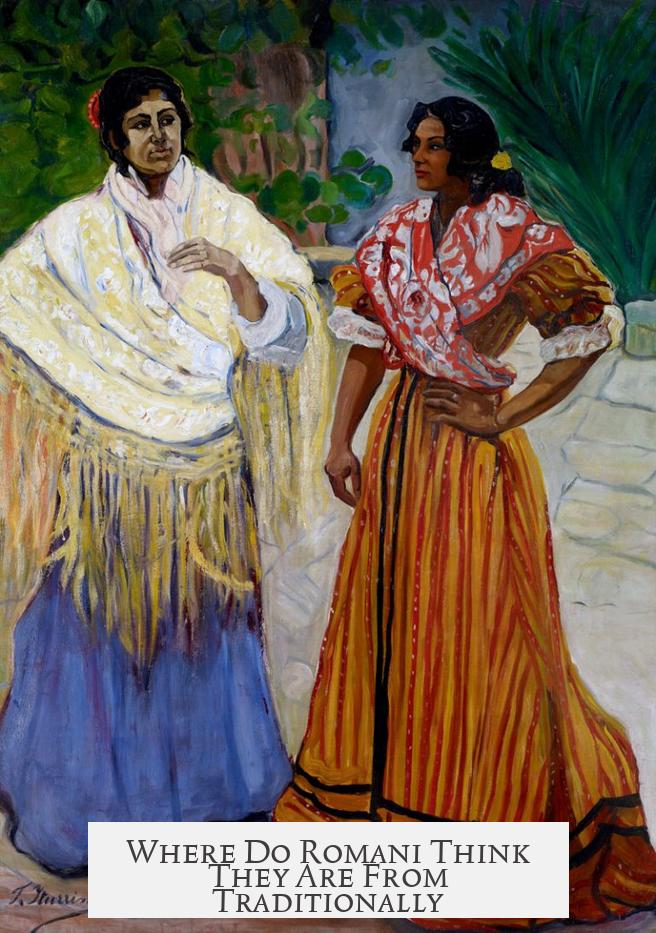
Romani traditionally believe they come from India, yet their own stories and myths about their origins are as diverse as the journeys they have taken through history. This mix of folk tales, historical accounts, and modern interpretations creates a rich tapestry that reveals much about Romani identity, cultural resilience, and the significance—or lack thereof—of any fixed homeland.
But what exactly do Romani people say about where they are from? How has this shaped their culture and sense of belonging? Let’s take a captivating journey from ancient rivers to mythical lands to understand this complex heritage.
The Historical Claim: India as the Ancestral Homeland
The earliest recorded encounters with Romani people reveal their own claim that they hail from India. Back in 1422, an Italian named Foroliviensis wrote that Roma in Italy said they were “from India.” Later, in 1544, Sebastian Munster met Roma in Germany who pointed to Asia, along the Ganges and Indus rivers, as their place of origin. This isn’t just hearsay. Many European records from the 12th to 17th centuries corroborate this Indian link.
From a modern scientific viewpoint, linguistics and genetics strongly support this. Roma languages share roots with northern Indian languages, while DNA studies echo this origin story. Yet, for a long time, the Romani people themselves had little knowledge or memory of these deep ancestral roots.
Myths and Folk Stories: The Romani Narratives

Romani oral traditions add layers to the Indian-origin story, painting a more mystic and emotional picture. For instance, in Romanian Romani folklore, there is a popular tale called “O Romano Them” (The Romani Country). It speaks of an ancient Romani kingdom that dried up under drought, forcing their migration. This story offers a heartfelt explanation for the loss of homeland knowledge, implying that time and hardship led to forgetting where they truly came from.
Another poignant tale, “O Kamipen” (The Love), tells that Romani people asked God for love instead of land because they came late to the division of the world. This beautifully explains why Roma have no home country, emphasizing love and community over geography.
These stories aren’t just whimsical tales; they offer insight into how Romani people process displacement and the absence of a fixed homeland.
Alternative Myths: Egypt and Israel
Romani origin myths are not limited to India or folk stories. A well-known myth says Roma descended from ancient Egyptians. Whether this started because Europeans confused Roma with Egyptians or Roma themselves adopted it for safety or identity reasons remains uncertain.
Another story popular in communities, especially in Hungary and the U.S., claims Roma descend from a lost tribe of Israel. This has both religious and cultural implications, suggesting identity can be fluid and shaped by context.
Isn’t it fascinating how different groups create origin tales that suit their circumstances and hopes? These myths, though historically inaccurate, reflect deeper desires for belonging and dignity.
The Complex Relationship With Homeland
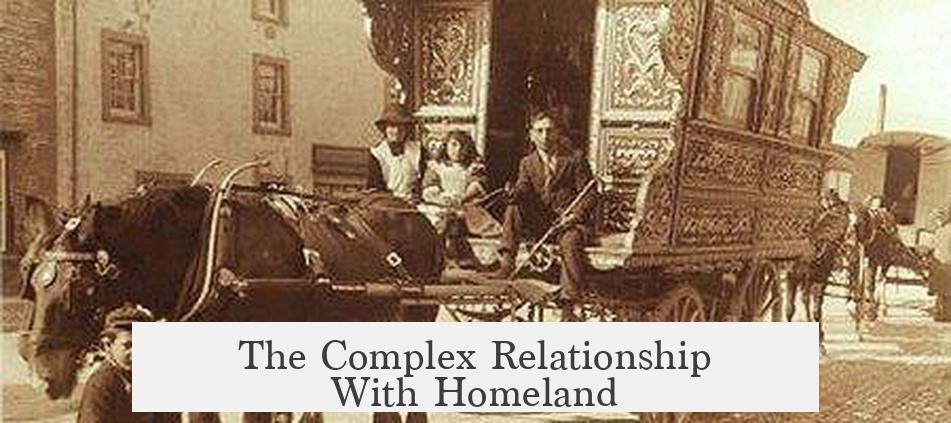
So, do Romani people long to return to India or any other ancestral land? Not really. As scholar Dr. Ian Hancock points out, unlike Jewish people who deeply identify with Israel, Roma have never been strongly attached to a native land. This might explain why Roma have moved so much across Europe and beyond over centuries.
Roma acknowledge their Indian roots, often with pride, but they do not seek to “go back.” Some even view Indian origin stories as ideas imposed by European academics, because much of their heritage was lost during centuries of displacement and persecution.
This detachment from a specific homeland doesn’t mean lack of identity. On the contrary, Mexicans, Italians, or Japanese often cherish homeland strongly, yet Romani culture focuses on community, shared tradition, language, and adaptability.
What Can We Learn From This?
Romani origin stories remind us that identity is not always tied to land. It can be shaped by stories, struggles, and survival. Understanding Romani origins involves peeling back historical facts and appreciating cultural nuances.
For those curious about Romani history, here are a few practical recommendations:
- Explore Romani language roots: Linguistics offers clues that connect Roma to India’s languages.
- Listen to folk tales: Stories like “O Romano Them” hold emotional truths about migration and loss.
- Recognize the power of myths: Whether Egypt or Israel, myths reflect hopes and identity beyond simple history.
- Appreciate the nuance: The lack of a homeland attachment doesn’t equate to rootlessness; it reflects a unique global identity.
What does the Romani story teach us about identity in our globalized world? Perhaps, it challenges the idea that everyone needs a single place to call home.
Conclusion
In the end, Romani traditionally think they come from India, but their journey is richer and more complicated than a single point on a map. Their heritage blends historical facts, heartfelt myths, and modern rediscovery. Understanding this helps break stereotypes and highlights the resilience of Roma culture. It’s a story of movement, memory, and meaning that continues to evolve as Roma live out their unique identities across the world.
So next time you wonder about Romani origins, remember: it’s not just about geography—it’s about stories, survival, and the power of community.
